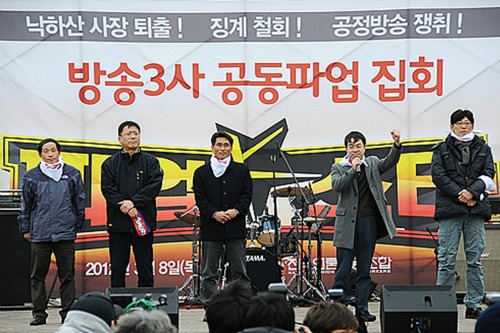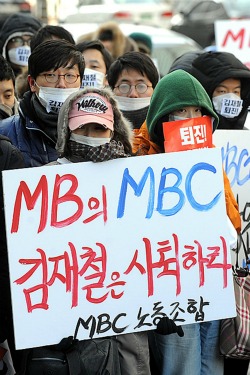“Yes, I have heard of Naneun Ggomsuda or NaGgomSu. Yes, nowadays nobody can deny knowing about it. It’s just so hooking you cannot stop hearing it!” says a student about her thoughts on the podcast. NaGgomSu (I’m a petty-minded creep) is one of the most popular podcasts on Apple’s iTunes. Lampooning President Lee’s governing style and raising speculations about him and his aides, the show has gained a cult following among young people and clearly expresses their frustration with the government. “Naggeomsu is a good way to reach young people and citizens of different levels in society because it’s fun and interesting,” says Jeong Hye-jeong (Senior, Dept. of English Language and Literature). Podcasts, downloadable forms of programs through smart phones and other devices, have hooked many Koreans, young and old, as they provide critical information and opinions on the sad realities of modern-day South Korea. The popularity of podcasts especially amongst young people gives us a quick insight into the changing contour of Korean society. We are fortunate; this is just the start of the rise of alternative media in South Korea.


Podcasts: A Form of Alternative Media
From the government to mainstream news media companies, podcasts have shown its importance in reaching out to the public. “I think that podcast programs play the role that traditional mass media had failed to do—they deliver the messages that huge networks controlled by the government do not say to the public,” says Kwon Su-bin (Senior, Dept. of Japanese Language and Literature) on her thoughts on alternative media. What started from NaGgomSu became an outlet to broadcast the views of ordinary citizens, and not the media conglomerates. A good example is the recent strike against the three major Korean news media companies which in turn had resulted to the production of podcasts such as the MBC Strike Channel and Reset KBS, which are podcasts that highlighted the real issues of Korean mass media.
Started by the initiative of MBC reporters holding a strike from January 30th, 2012, KBS, YTN and Yonhap News followed, demanding the presidents of the four media giants of South Korea to step down. With the help of podcasts, the strike became more visible to many people. It became a stepping stone to encourage people to actively participate in politics as much as they can do as ordinary citizens. On March 16th, a rough number of 20,000 people attended a concert held by the journalists on strike from the news media companies to call for the resignation of its company presidents, alleged to be puppets of the government. As the number of people downloading and listening to podcasts such as MBC Strike Channel and Reset KBS increase, not only do more people get vital insights into the realities behind different aspects of the Korean society but what we see are the visible cracks in mainstream media.


Reality of Mainstream Media in South Korea
Since President Lee gained power, press freedom in South Korea has been declining at an alarming rate. Current Presidents of MBC, YTN, KBS and Yonhap News were assigned having connections with President Lee. The MB Administration censored reports and stories including reports on the Four Major River Restoration Project, FTA, and the Cheonan ship incident. It became hard to find unbiased reports on sensitive issues. In certain cases, it was not even possible to cover a story.
Journalists who resisted such attempts to cover freedom of speech faced disciplinary actions such as dismissal or suspension. Furthermore, journalists usually face indictment. Since the start of the MB Administration, approximately 249 journalists have been submitted to disciplinary measures, and 60 journalists have been indicted. Action has been taken by fellow reporters from all the media companies, demanding the administration to step down and clean the name of South Korean media professionals once and for all. If the strikes of union members do not succeed, then the appointees of MB Administration will succeed in blocking the mouths of journalists through litigation and disciplinary action thus damaging freedom of speech.
This is the reality of mass media in South Korea. The current government is manipulating the media and uses them as propaganda machines, something that has been happening for decades since the birth of mass media in South Korea. The unfulfilled role of news media to provide black and white information to citizens is being achieved by alternative media such as the infamous podcasts. But is it real participatory politics that we see in this paradigm shift of the Korean society? “While we have alternative media in our midst—Podcasts, internet media or whatnot—citizens will never cease to rely on mainstream media for information for one main reason: convenience,” said Kwon Su-bin (Senior, Dept. of Japanese Language and Literature). The problem of low participation has infact always been a problem in different sectors of society and is currently a big threat to alternative media. NaGgomSu has sustained its popularity, but the question is until when? Is it wishful thinking that subscribers of alternative media will play blind to the realities that they are made aware of through the efforts of concerned citizens?
Campus Media: Another Form of Alternative Media at CNU
In addition to podcasts in Korean society, Chonnam National University (CNU) has different forms of alternative media as well. One example is the CNU Press and Broadcasting Center, and another is the Yongbong Press, focused on providing information on the reality about social issues in and out of CNU. Ever since its establishment, CNU has been a nurturing ground for citizens hungry for freedom of speech, and until now it is evident through different student factions that produce alternative media. They come in different forms: print, broadcast and online. “Tough despite being small in size, alternative media at the university front acts as a springboard towards a more empowered student community,” says Choi Ji-hyun (Junior, Dept. of English Language and Literature).
Three realities are provided by the boom in alternative media in the South Korean paradigm. Firstly, the mass media is being manipulated by the government. Secondly, citizens have the capability to resist using ubiquitous systems and strengthened communication. Citizens, students or not, have the motivation to get involved in with alternative media. Finally, we have a voice to speak out if we wish. Through increased citizen involvement alternative media, including podcasts and campus media, are a manifestation that the people have the power to change history. As the youth becomes more and more wired using new systems of communication in South Korea, it has the role to pass on information to others, becoming the new stimulus for change. The small defeats the big, but in reality the concentrated efforts of all citizens, particularly the youth, makes a huge difference. Now, the government has nowhere to hide.
By Rigoberto Banta Jr., Student Editor
[Special Report]
Rigoberto Banta Jr. 기자
rj.banta@yahoo.com.ph

